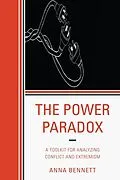The Power Paradox: A Toolkit for Analyzing Conflict and Extremism reveals how mainstream views of power restrict the conceptual insights needed to resolve conflict. Anna Bennett insightfully explores Michel Foucault's work on power and discourse in order to advance conceptual and contextual tools for understanding power dynamics. Through an examination of a range of extremist, terrorist, and counter-terrorist rhetoric, as well as various theories of power, Bennett analyzes the widespread problems associated with assuming that power is only repressive and competitive. This limited view reinforces - often unwittingly - divisive dynamics and stubborn polemics, which serve to continue conflict. By offering a comprehensive and constructive view of power struggles, The Power Paradox argues that power is a relational dynamic. Bennett identifies fascinating contradictions within discourses of power and relational dynamics, acknowledging the enduring quandary of power struggles: we are all implicated within them.
Autorentext
By Anna Bennett
Inhalt
Preface
Acknowledgements
Introduction
Part I: The Theory of Power
1. Power and Resistance
2. Foucault's Legacy
I. His Work
II. Developments & Inconsistencies
3. The Notion of Power
4. Re-cognising Power
Part II: Politics, Power and Extremism
5. The American Militias
6. Waco
7. Hansonism
8. The Unabomber
9. Terrorism and the War Against It
Conclusion: Power as Generative: The Ongoing Work of Insight and Reflection
Bibliography
Index
